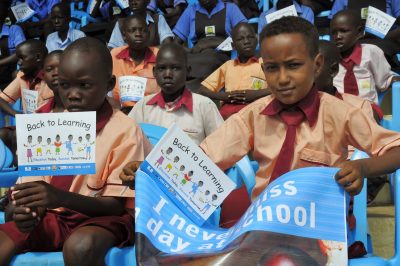By
Peter Louis
The Ministry of Education, Science and Technology (MoEST) yesterday launched the first ever comprehensive national education curriculum for South Sudan.
Speaking at the launch in Juba, the Minister for said department Dr John Gai Yoh said that the completion of the curriculum marked an important milestone in the history of education in South Sudan as the country now has a complete, harmonised and recognised curriculum in line with regional and international education standards.
With the generous support from the Global Partnership for Education, UNICEF (as its Managing Entity in South Sudan) partnered closely with the Department for International Development (DFID) to support MoEST launch the new curriculum under the theme: ‘Harmonised Education Service Delivery for Nation Building, Peaceful Co-existence and Lifelong Learning for All’.
In keeping with global trends, the new South Sudan Curriculum is competency-based and integrates life skills and peace education, gender, human rights and environmental awareness into school subjects. The curriculum includes academic and co-curricular activities to provide a variety of experiences for learners. The new curriculum is designed to systematically strengthen early literacy and numeracy, impart basic life skills that are important for peace building (cooperation, tolerance, identity, appreciation cultural diversity, etc), and engage learners to enhance their overall positive cognitive, psychosocial and attitudinal transformation.
Prior to the launch of the national curriculum, there was no complete or comprehensive curriculum in South Sudan. Some schools were using the South Sudan curriculum while others were using curricula from neighbouring Uganda, Kenya and Sudan. The new curriculum covers the whole basic education system including Early Childhood Development, Primary Education, Secondary Education and the Accelerated Learning Programme and Community Girls’ Schools.
“Today’s launch marks the beginning of a long road for all,” said Jonathan Veitch, UNICEF Representative in South Sudan. “We must focus on getting children into schools, for while the curriculum is complete, textbooks must be designed and published; teachers need to be trained to implement this curriculum, and school managers, inspectors and supervisors require training to provide the required management and oversight.”
Participation in education in South Sudan has deteriorated since the conflict broke out in December 2013, which saw an estimated 400,000 school-aged children forced to drop out of school due to displacement and insecurity. Critical gaps in education include: limited school infrastructure (less than 50% of schools have semi/permanent classroom, 60% without drinking water and 43% have access to latrines), lack of trained teachers (60% untrained), low primary school completion rate (less than 10%) and lack of basic teaching and learning supplies. South Sudan remains one of the countries with the lowest literacy indicators globally, with only 27% of adults able to read and write.
The new South Sudan curriculum aims to foster a new generation of learners who are knowledgeable, respectful and supportive of peace and prosperity, growth and development, harmony and for justice, as clearly articulated in the National Curriculum Framework.



No Comments Yet!
You can be first to comment this post!